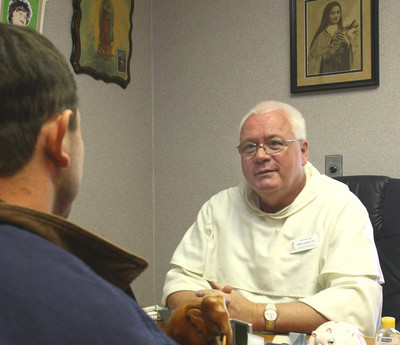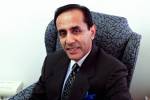Hepatitis increases HIV worry
Bottles of medications to keep 60-year-old Phylis Marino's HIV under control sit on the coffee table in front of her. So do pain pills and a written reminder of an upcoming medical test on her liver, now being attacked by hepatitis C.
A cane leans against the couch where she rests. Near the front door of her tiny Henderson apartment is the electric wheelchair that moves her when her legs can't.
"If I ever find out that I gave HIV to someone where I had my colonoscopy done, I couldn't handle it," she said, putting a finger to her lips in an attempt to quiet her three barking Pomeranians. "I don't want to hurt anybody. That's the last thing I'd want to do. I couldn't live with myself. My conscience would drive me crazy."
Ever since officials with the Southern Nevada Health District held a Feb. 27 news conference to announce that 40,000 former patients of the Endoscopy Center of Southern Nevada would be notified to get tested for hepatitis and HIV, worry about transmitting the disease she contracted long ago through a blood transfusion has gnawed at Marino.
That concern has outweighed the anger Marino carries against the clinic on Shadow Lane for another reason. She and her doctor believe that her hepatitis C came as the result of an infection she picked up during a colonoscopy at the clinic in 2004.
"When I got that letter to get tested, Dr. Mike (Karagiozis) and I knew that's where I got the hepatitis from for sure," Marino said. "He had always tested my blood, and we couldn't figure out where it came from all of a sudden. But I can't get the HIV off my mind now. I can't bear the thought of my giving HIV to someone. I had been so careful for more than 25 years never to put anybody at risk."
Marino has hired attorney Valerie Fujii to handle her case against the center.
It isn't easy to quantify how great the risk is that patients treated at clinics run by Dr. Dipak Desai will end up infected with the blood-borne human retrovirus that causes AIDS.
To date, the Southern Nevada Health District has tied seven hepatitis C cases to his businesses; no HIV cases have been officially associated with the clinics.
Still, according to Brian Labus, the district's senior epidemiologist, the reuse of syringes and vials witnessed by public health investigators at a Desai clinic is a breach of universal precautions that can allow transmission of HIV.
"It is too early in our investigation to say how many cases we'll have," Labus said, adding that patient lists made available to health officials were incomplete and many notifications could not be made because people moved.
Attorneys contacted by the Review-Journal believe they have substantial evidence that patients contracted HIV at the Shadow Lane clinic. Attorney Robert Eglet has six of them as clients; attorney Richard Harris has one. The attorneys have filed class-action lawsuits against Desai and his clinics.
Karagiozis, who has been employed by Eglet to investigate claims by former patients, said the patients represented by Eglet seem to have solid footing.
"I haven't done all the investigation," he said. "But from what I know right now, the lack of risk factors seem to bear out what they're saying."
Eglet is more direct.
"We're talking about parents and grandparents who don't engage in risky sexual behavior and don't do drugs," he said. "They're not the kind of people you see with HIV."
There is no question that many Southern Nevadans are particularly worried about transmission at the clinic of HIV, a disease many believe carries a stigma unlike any other.
People with HIV often immediately associated with dangerous sexual practices, intravenous drug use and homosexuality, Karagiozis said.
About 30 percent of his family practice is devoted to HIV patients in the Las Vegas Valley, and Marino was his patient long before the current health crisis.
"There are people who are thinking we're sweeping it (HIV) under the rug," said Jennifer Sizemore, a public affairs official with the health district. "But that's not the case at all."
Labus said it is important to remember some statistics if one has been exposed to someone else's blood at the medical centers. Research shows that fewer than one-half of 1 percent of people in the clinic population would have HIV, while one-half of 1 percent would have hepatitis B; about 4 percent have hepatitis C. The numbers could suggest why there would be fewer cases of HIV as an outgrowth of breaches in protocol at the clinic.
In 2007, there were 50 new cases of HIV recorded, according to the health district. So far this year, there have been 42.
Mary Ellen Harrell, a health district community health nurse manager who works with HIV cases, said she has been contacted by people who knew they had HIV prior to procedures at Desai's clinics.
"We don't want them to feel guilty," she said. "This was a practice that should never have occurred. If the health care providers had practiced universal precautions, as they're supposed to on each and every case, there would have been no problem. This had nothing to do with the patients. I sympathize with them."
The Rev. Joe O'Brien, a Catholic priest who counsels HIV patients at St. Therese Center HIV Outreach in Henderson, said he has talked with more than 25 HIV clients about Desai's clinic.
"They all had procedures there and are worried they passed HIV on," he said. "They're also worried that they may have caught something else that may make them even more sick."
He continues to counsel Marino. "This is a very difficult time for her," he said.
Harrell said the health district reviews reports of HIV each month that come in from physicians and labs. Some of those reports involve people who already have been documented with the disease.
"We check out each and every one," Harrell said. "We have had no spikes since the health care crisis began."
She said it is possible the health district has yet to see test results of patients who are now represented by attorneys.
Harrell said she is concerned that misinformation is being communicated about HIV and blood tests.
She said people who test negative six months after a possible exposure don't need to keep having tests.
"We have heard that people keep saying they need to get tested for the next 10 years, and that's just not true," Harrell said.
If a patient's early test is negative and they have no risk factors over their lifetime, subsequent tests would come up negative, she said.
"That's why it is so important that people get tested as soon as possible," she said.
Marino got tested a couple of years after a blood transfusion in the 1980s that she had following an accident in New York City.
"I was lucky," she said. "I didn't even need medications for HIV until 2002."
After working in her family's food business in New York, she moved to Southern Nevada in 2003. She followed her physician's advice to get a colonoscopy to check for cancer in 2004.
Since then, she has had chronic health problems that wouldn't allow her to work for a catering firm. A Social Security disability check, coupled with her sister's help, allow her to pay the bills. Medicaid takes care of her medical expenses and medication.
Over the last couple years, her spleen and appendix became inflamed. Frequent hospitalizations occurred.
"I just swelled up terribly," she said. "For a long time, I wondered how I got hepatatis C. It's made me sicker than HIV ever did."
To her doctor, there is no question how she got hepatitis.
"We went through every risk factor, and the only way she got it was at the endoscopy clinic," Karagiozis said. "What she's going through now because of the hepatitis is the worst thing you can imagine."
Still, as she sat in her living room Friday smoothing out her reddish-purple pant suit, Marino said she can't dwell on her situation.
"When I think about it too much, I get depressed," she said. "And that's no way to live. I think I'll put on an old Charlie Chan movie. I want to be happy."
Contact reporter Paul Harasim at pharasim @reviewjournal.com or (702) 387-2908.





























